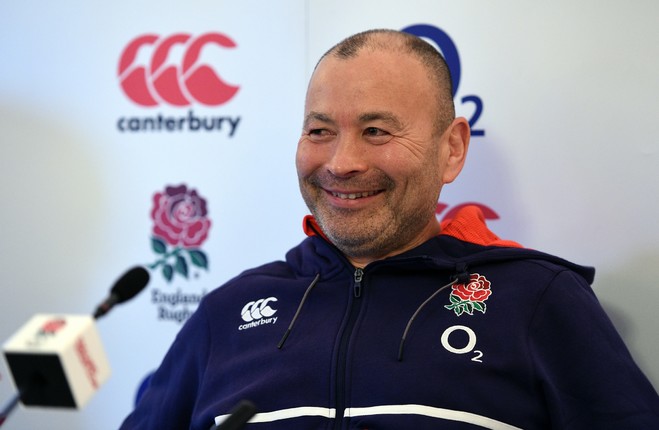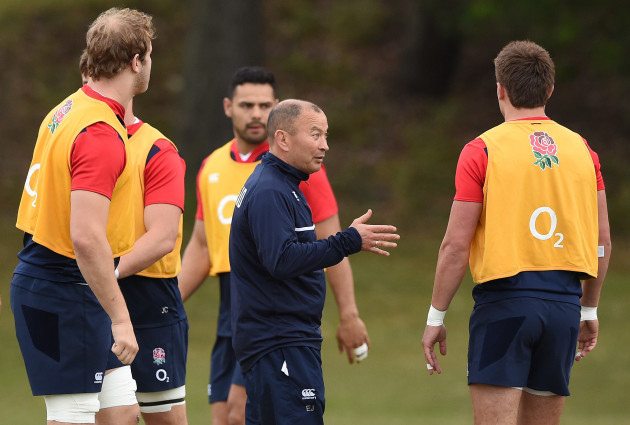THE SHORTLIST OF potential suitors to fill the role vacated by Stuart Lancaster was, apparently, quite a short list.
England had just become the first host nation to fail to qualify from the pool stages of a World Cup, and even before their 2015 World Cup campaign had ended, it had become increasingly clear that Stuart Lancaster would not be sticking around.
The papers were rife with speculation about who would be the next man in.
Nick Mallett, the former South Africa and Italy coach, admitted he had turned down an approach from the RFU before England had even played their final pool game against Uruguay. The union swiftly denied any such approach had been made, but it was evident that the wheels had been put in motion.
Lancaster was officially removed from his position in November, and the RFU’s attention turned to the next few names on their list.
Some of those names appeared more attainable than others.
Joe Schmidt was going nowhere. The New Zealander had only recently signed a new contract with the IRFU, and felt he had unfinished business after an injury-depleted Ireland team crashed out in the World Cup quarter-finals at the hands of Argentina.
Scotland boss Vern Cotter was also mentioned, but he too was also under contract and would need to be bought out.
Of course the RFU had the money to go out and get whoever they wanted. At the time, they had a turnover of around £150 million a year.
Was it worth trying to prize Warren Gatland away from Wales? Would Jake White be a gamble 13 years on from his last head coach role in international rugby? Other names such as Mike Ford and Rob Baxter were also floated.
Then there was Eddie Jones.
For a start, the RFU knew he was keen. Jones had a column in the Daily Mail during the World Cup, and had used that forum to make it clear that he would be open to an approach as Lancaster came under increasing pressure. Jones went as far as writing that “He [Lancaster] will learn from his mistakes and, if he can‘t do that, I think he should go.”
Two weeks previously, Jones had steered Japan to a famous defeat of South Africa at the World Cup. That result sent his stock through the roof.
The problem was, just two days after that stunning win against the Springboks Jones had been snapped up by Super Rugby franchise Western Stormers.
The day after Lancaster was sacked, Jones was unveiled as Stormers coach and was asked about the links with England which had yet to die down.
“There has been no contact and I am committed to the Stormers. I woke up this morning and looked at Table Mountain … I’m very happy to be here,” Jones replied.
Whether that was true of not, what we do know is that the following Wednesday, Jones received an offer which the Stormers described as being “simply impossible for any coach to turn down.” He jumped on a plane the next day and began thrashing out the details of a contract with RFU chief executive Ian Richie that would see him double the record £235,000 salary he had penned with the Stormers.
Richie hadn’t been immune to the backlash that followed England’s World Cup exit, and he too needed to get his next appointment right.
Jones cancelled his contract with the Stormers and was officially named as England’s new head coach just eight days after that unveiling in Cape Town.
“While this is very disappointing for us all at WP Rugby and the DHL Stormers, Eddie is quite clearly the most sought-after coach in world rugby and this is the biggest and most lucrative job in international rugby,” admitted Western Province Rugby Football Union President, Thelo Wakefield.
For their troubles, Stormers pocketed a compensation fee believed to be upwards of £300,000.
Yet despite being one of the most in-demand coaches around, not all were convinced by his appointment. Memories of an ill-fated stint at Saracens, Jones’ only previous job within the English game, were still fresh in the minds of England supporters.
Jones had come on board with Saracens as a consultant in 2006, before returning as director of rugby in 2008. The following February he announced that he would be leaving the club for personal reasons. Saracens finished ninth in the Premiership and Jones later admitted that period of his career was “the worst” he had had in rugby.
More casual supporters may have remembered him as the head coach who saw his Australia team beaten by England in the 2003 Rugby World Cup final.
There was also the added pressure of being England’s first foreign head coach, a weight which could quickly have become a burden if results didn’t go his way. The manner in which Lancaster had been treated was a stark reminder of just how viscous some sections of the English media can be.
Born in Tasmania to a Japanese-American mother and Australian father, the former schoolteacher did not the fit the bill of the traditional England head coach.
Jones responded to the doubters with the most valuable currency in sport – results.
Less than six months after that disastrous World Cup campaign, Jones led a revitalised England to a Grand Slam. They the won all three Tests on their summer tour to Australia, and finished the year with a 100 per cent record from their 13 games.
They carried that fine form into 2017, with the only blip a final round defeat to Ireland on the day his team lifted the Six Nations trophy in Dublin.
In January 2018, he was rewarded with a new contract and significant wage increase, believed to be in the region of £750,000, making him the highest paid coach in world rugby. At the time of signing, Jones had lost just one of his 23 Tests as England coach.
It hasn’t all been smooth sailing of course. In 2018 England lost five games on the bounce, a run which saw Jones roundly booed when his face flashed up on the big screens at Premiership games as recently as 12 months ago, but overall his appointment has been a resounding success.
The real mark of quality has been how Jones has conditioned his team to hit their best form when it matters most. Last weekend’s World Cup semi-final defeat of New Zealand was one of the most impressive team performances of the last decade.
A win against South Africa tomorrow, will solidify Jones’ place in English rugby history.
It looks as though the gamble has paid off.


